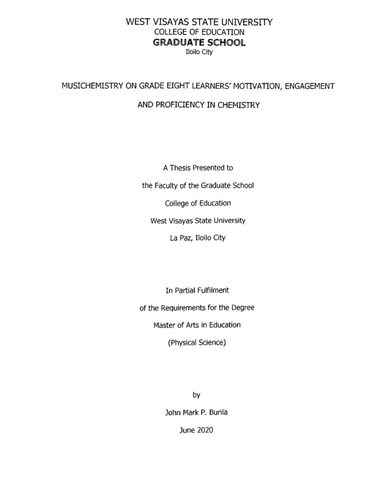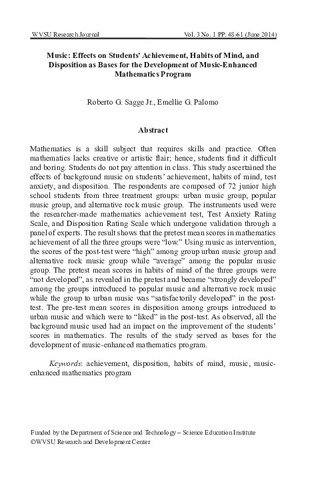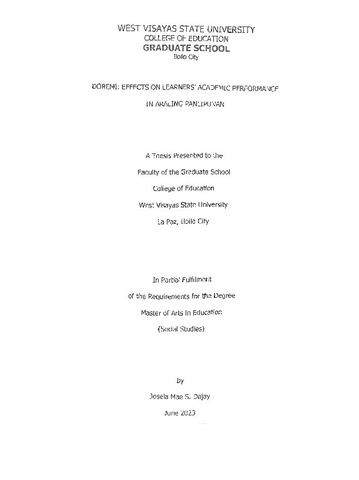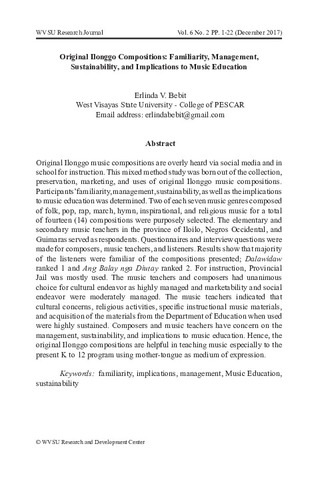Musichemistry on grade eight learners' motivation, engagement and proficiency in Chemistry
Share
Abstract
This quasi-experimental study aimed to investigate the effect of musichemistry on grade eight learners' motivation, engagement and proficiency in Chemistry and the relationship among the three variables. Furthermore, it determined the level and significant differences in learners' motivation, engagement and proficiency in Chemistry before and after exposure to music-based teaching (MBT) and non-music based teaching (NMBT). Sixty (60) grade eight regular class learners coming from two sections of the research locale for the academic year 2019 and 2020 were the subject of this study. The subjects were selected through match-pairing using their pretest proficiency score in Chemistry. Toss coin was used to determine which section becomes the music group and the non music group. The adopted Chemistry Motivation Questionnaire (CMQ), Science Engagement Scale (SES), and the researcher-made Proficiency Test in Chemistry (PTC) were the instruments used. PTC underwent expert validation and pilot testing. The mean, mean gain and standard deviation were employed for the descriptive analysis of the study. The inferential statistical tools employed were the t-Test for Independent Samples, t-Test for Dependent Samples and Pearson's Product Moment Correlation Coefficient Test, all set at .05 alpha level of significance. The pretest mean scores in motivation and engagement for both groups were classified as "average". Pretest mean scores in proficiency for both group were classified as "low". I the posttest, MBT group was classified as "high" for motivation and engagement while NMBT group was classified as "average" MBT group's mean score in proficiency was classified as "average" and "low" for the NMBT group. The mean gain scores of the MBT were higher compared to the NMBT group in all parameters. Before the intervention, the learners from the two groups did not have a significant difference in terms of their motivation, and proficiency in Chemistry. However, a significant difference existed between the two groups in terms of engagement. After the intervention, a significant difference exists among the three variables in favor of the MBT group. There is a significant difference in the MBT group learners' motivation, engagement and proficiency in Chemistry before and after exposure to MBT. On the other hand, there is no significant difference in the NMBT group learners' motivation, engagement and proficiency in Chemistry before and after exposure to NMBT. A significant difference also existed between the mean gain scores of the learners in both groups (MBT and NMBT), in terms of motivation, engagement and proficiency in chemistry. There is a significant relationship between the learners in the MBT and NMBT group, in terms of motivation, engagement and proficiency in Chemistry. Furthermore, the challenges and experiences of the grade eight learners in learning through musichemistry include, but are not limited to, the following: (a) difficulties in learning chemistry through music; (b) meaningful learning experiences in learning topics in Chemistry; (c) concretizing chemistry through music; and (d) building learner-teacher positive relationship.
Recommended Citation
Burila, J. M. P. (2020). Musichemistry on grade eight learners' motivation, engagement and proficiency in Chemistry. [Masters' thesis, West Visayas State University]. WVSU Institutional Repository and Electronic Dissertations and Theses PLUS.
Type
ThesisKeywords
Grade 8 learners Engagement Motivation Musichemistry Proficiency in Chemistry Music and its effects on the brain Music Music as mnemonic device Self-determination theory Academic achievement Music and academic achievement Music-based classroom instruction Music as a background Instrumentals as analogy Lyrics as content Pre-existing popular music Original content-based songs Parodies Music and Science instruction Quasi-experimental pretest-posttest design Chemistry Motivation Questionnaire (CMQ) Science Engagement Scale (SES) Proficiency Test in Chemistry (PTC) Chemistry
Subject
Degree Discipline
Physical ScienceDegree Name
Master of Arts in EducationDegree Level
MastersPhysical Description
xv, 192 p.
Collections
- 2. Master's Theses [162]
Related items
Showing items related by title, author, creator and subject.
-
Music: Effects on students' achievement, habits of mind, and disposition as bases for the development of music-enhanced mathematics program
Sagge, Roberto G. Jr.; Palomo, Emellie G. (University Research and Development Center, West Visayas State University, 2014-06)Mathematics is a skill subject that requires skills and practice. Often mathematics lacks creative or artistic flair; hence, students find it difficult and boring. Students do not pay attention in class. This study ascertained ... -
DOREMI: effects on learners' academic performance in Araling Panlipunan
Dajay, Josela Mae S. (West Visayas State University, 2023-06)This quantitative and qualitative study was an investigation of the effect of DOREMI (Doing Reading with Music Intervention) on Learners' Academic Performance in Araling Panlipunan. DOREMI was used determine if teaching ... -
Original Ilonggo compositions: familiarity, management, sustainability, and sustainability, and implications to music education
Bebit, Erlinda V. (University Research and Development Center, West Visayas State University, 2017-12)Original Ilonggo music compositions are overly heard via social media and in school for instruction. This mixed method study was born out of the collection, preservation, marketing, and uses of original Ilonggo music ...





